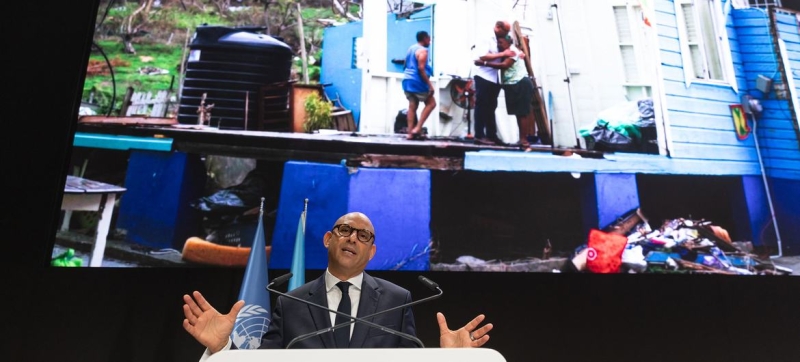
UN Climate Change Executive Secretary Simon Still delivers a speech in Baku at the opening of COP29. The annual UN Climate Conference opens in Baku Climate and Environment
Simon Steele, the Executive Secretary of the UN Framework Convention on Climate Change (UNFCCC), told negotiators at the 29th UN Climate Conference that opened in Baku today that agreeing on an ambitious new climate finance target is critical for the well-being of all countries, including the richest and most powerful.
“Let’s abandon the idea that climate finance is pure charity: accelerated climate change affects everyone in the world in some way,” Steele said.
A strong call for action from the head of the UNFCCC has kicked off a tough round of talks in the capital of Azerbaijan. The conference will seek to agree a new annual target for climate finance. That target would replace the $100 billion pledge made in 2009 that expires at the end of the year. Many say $100 billion is far short of what is needed to cope with rapidly rising global and ocean temperatures.
Steele stressed that the platform provided by the UN Climate Conference is the only place where humanity can address the climate crisis. “We know this process works because without it we would be heading towards five degrees of global warming,” he added.
“No country is immune”
Simon Steele has made a compelling case for why a new climate finance deal is essential. He says every country will “pay a terrible price” if two-thirds of countries cannot afford to cut emissions quickly. Moreover, the entire global economy could collapse if countries fail to shore up supply chains in the face of the rising costs of climate shocks. The recent drop in water levels in the Panama Canal, for example, has had a dramatic impact on shipping volumes.
“I regret to say that this conference alone will not deliver the full transformation that every country needs, but this is where we need to find a way out of this mess. That is why we must agree a new global climate finance target here in Baku,” Simon Steele said.
The UNFCCC Executive Secretary is from Grenada, whose home island of Carriacou was almost completely devastated by Hurricane Beryl in July this year. Speaking against a backdrop of destroyed buildings, Steele told COP29 delegates that he was inspired by the millions of people around the world who were falling victim to climate change but were “getting back up again and again.”
“Stand your ground and push through”
“We can’t stand by and watch as lives and livelihoods are destroyed around the world, so let’s make these new commitments a reality,” Steele said.
The UNFCCC chief rhetorically asked delegates a series of simple questions: Do they want to see the cost of groceries and energy bills go up even more and their countries become economically uncompetitive, and do they want even more global instability?
“If the answer to any of these questions is ‘no’, then it is clear that a new climate finance agreement is critical,” Steele said. In this regard, he called for vigorous reforms of the global financial system, which are necessary to effectively combat climate impacts.
In conclusion, Simon Steele recalled the historic significance of COP29. “We cannot leave Baku without achieving significant results,” he said, urging delegates to “stand our ground and get what we want.”
He called on all countries to demonstrate that global cooperation is not weakening but “rising to this moment.”
Hottest Decade
On the opening day of the conference in Baku, the World Meteorological Organization (WMO) released an update on the state of the climate in 2024, showing that climate change is accelerating due to rising greenhouse gases in the atmosphere.
The WMO report says 2015-2024 will be the hottest decade on record. In the coming years, the loss of glacier ice will accelerate, sea levels will rise and oceans will warm. Extreme weather is causing significant damage to people and economies around the world.
The global average surface air temperature was 1.54°C above the pre-industrial average from January to September 2024, according to an analysis of six international datasets used by the WMO.
